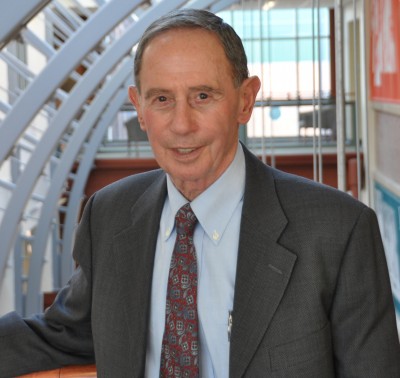
Fresh out of UConn Law School in the early 1960’s, Howard Klebanoff found himself in the middle of history, having landed a job in the Kennedy administration at the U.S. Department of Labor. He was as infused with the spirit of “Camelot” as anyone.
“A lot of us who were down there at that time felt we were going to change the world,” Klebanoff says. Nearly 50 years later, it’s clear that Klebanoff made good on his youthful aspiration for change, most dramatically in public schools across Connecticut.
But before the big changes he would help create, there were small ones, centered around his family and their Hartford neighborhood in the late ’60s and early ’70s.
Klebanoff and his wife had seen firsthand the “white flight” that had driven many families out of urban life and urban schools, but they were determined not to be one of them. “I wanted our children to live in a multi-cultural area,” he says.
At about the same time, however, their daughter developed a hearing impairment and other health problems as a result of high fevers, which brought them into a public school landscape poorly prepared to handle children with disabilities.
The needed fixes were small, however—“little things,” as Klebanoff calls them—such as making sure his daughter’s desk was in the front of the classroom, the teacher always turning to face the class before speaking , and the teacher double-checking that his daughter’s hearing aids were turned on.
But after the child suffered her first grand mal seizure several years later, the situation with her education became more complicated. For Klebanoff, though, it was also eye-opening. “It gave me empathy for what parents of special needs children go through,” he says. “It also taught me that special education is a two-way street; that we, as parents, have to provide teachers with information about these conditions. It’s a partnership.”
In addition to empathy, though, Klebanoff also had the opportunity to initiate improvements. As House chairman of the Legislature’s Education Committee in the 1970s, he knew that Connecticut had relatively minimal special education laws in effect. Klebanoff built on that in an unlikely partnership that resulted from a phone call to Washington.
Hoping the Education Department might be able to help him find an “expert” in special education, he was told that two of the best were right at UConn, professors Jack Cawley and A.J. Pappanikou. Klebanoff invited both men to the state Capitol for a meeting, and Pappanikou set the tone right away, telling Klebanoff, “We’re going to make Connecticut a showplace for special education.” It wasn’t a suggestion.
Pappanikou put together a workshop on the Storrs campus for Klebanoff’s fellow lawmakers, aimed at developing support for the passage of special education laws. It worked and “we were off and running,” says Klebanoff, who, over the next 35 years, developed a close friendship with Pappanikou that lasted until his death in 2009.
The laws they wrote were supposed to be simple, aimed first at establishing some basic rights for parents of children with special education needs, such as easy access to records about their child’s progress. There would be a dialogue between parents and educators in determining the most effective path. Planning and placement teams (PPT) would map out what was best for the child.
If there were disagreements, mediation—rather than a hearing–would be available to resolve them. But questions arose that weren’t easily answered. What were the special education responsibilities of the school system? What were the responsibilities of the parents? PPTs became lengthy meetings, crowded with school personnel facing parents who, Klebanoff says, often felt intimidated and incapable of asking questions.
Klebanoff, who up to this point had been in general practice, found himself becoming more and more involved in educational law, seeking due process for parents trying to challenge decisions from school districts. Still, Klebanoff says, 80 percent of the firm’s cases were settled by what he calls “alternative dispute resolution.”
That concept of bridging the gap between parent and educator is also the mission behind the Howard Klebanoff Institute at the Neag School, which Pappanikou successfully urged UConn to establish in Klebanoff’s name.
“We wanted it to be a bridge to new ideas, new techniques, with parents and teachers drawn together for the benefit of children,” Klebanoff says. “Our hope is to have more Neag students involved as part of their preparation to be teachers of special education students.”
And what would Klebanoff’s perfect school system look like? “There would be a lack of defensiveness on both sides,” he says. “It would have an openness, where no one feels that one side is attacking the other. We don’t circle the wagons. We remember that the student is our most important consideration. Our firm’s motto says it all: ‘Of all nature’s gifts, the most precious is a child.’ ”
 Facebook
Facebook
 Twitter
Twitter
 LinkedIn
LinkedIn
